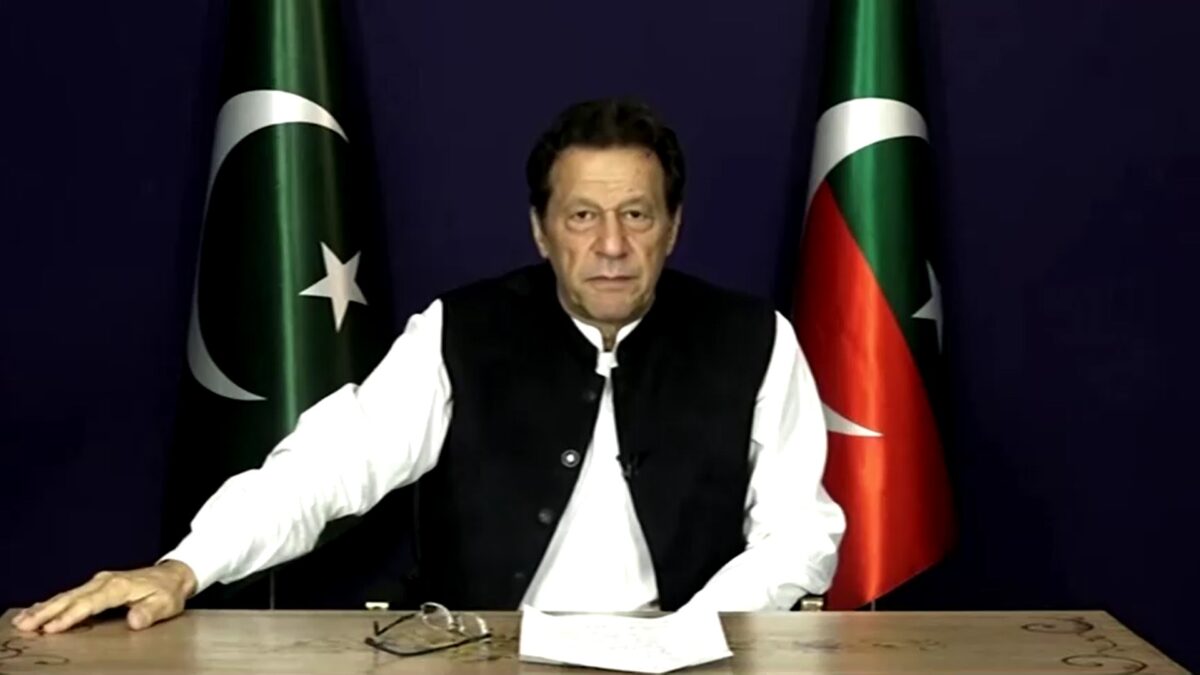In an address on Wednesday, former Pakistani Prime Minister Imran Khan said he would form a negotiating committee that will offer to talk with state authorities to seek a way out of the impasse.
He said if that committee was convinced the matter could be resolved by him stepping aside from politics or from not holding snap elections, he would comply.
“I will form a committee. I say two things. If they (government) convince the committee that Pakistan will get better without Imran Khan, and they have a solution, I will step aside for the sake of the country. I can back off. If you (government) can convince the committee the country will run in a better way without me, I am ready to quit,” Khan said.
“The second thing; they (government) should convince the committee what benefit Pakistan will get by holding election in October. We can understand well, they think they will crush Tehreek-e-Insaf until October. But how is it beneficial for Pakistan? Why should we wait until October when the country is on decline? They should convince us on these two things. I will constitute a committee. I will announce it tomorrow, God willing,” Khan added.
Khan says the corruption allegations were fabricated and that his associates are being forced out under duress from the government and the military in a manoeuvre to dismantle his party before elections scheduled later this year.
He has been embroiled in a tussle with the military since he was removed from power last year in a parliamentary vote which he says was orchestrated by the country’s top generals. The military denies this.
Khan is Pakistan’s most popular leader according to local polls, while the military is its most powerful institution, having ruled directly or overseen governments throughout Pakistan’s 75-year history.
The face-off has raised new fears about the stability of the South Asian country of 220 million people as it struggles with its worst economic crisis in decades.
A key aide of Khan said on Wednesday he was quitting politics, dealing a further blow to the embattled ex-premier’s party as a standoff with the military intensified.
Former Information Minister Fawad Chaudhry’s resignation is the latest – and highest profile – in a string of departures from Khan’s Pakistan Tehreek-e-Insaf (PTI) party, which the civilian government on Wednesday threatened to ban.
The former information minister spent days in detention after violent protests swept the country this month after the detention of Khan on corruption charges.
Chaudhry condemned the protests by Khan’s supporters, who attacked military installations, including army headquarters, and government buildings.
Chaudhry is the second former federal minister to leave Khan. On Tuesday, former Human Rights Minister Shireen Mazari announced she was leaving politics, citing health concerns, after spending 12 days in detention.
Most of the top leaders of the PTI have been taken into custody. A number of former parliamentarians and mid-tier leaders have quit the party or politics entirely over the last few days.
Another key aide, former Finance Minister Asad Umar also announced on Wednesday, hours after he was released from detention, that he was resigning from his party position of secretary general.
Khan, 70, became prime minister in 2018 with the tacit support of the military, though both sides denied it at the time. But he later fell out with the generals after being seen as having tried to interfere in key promotions in the security sphere.
After being removed from power last year, Khan has been campaigning for a snap general elections, rallying supporters across the country. But the prime minister who replaced him, Shahbaz Sharif, has rejected calls for a poll ahead of the due date late this year.
Khan has said the corruption charges were made up to banish him from politics. He was detained on May 9 but was later freed on bail.





